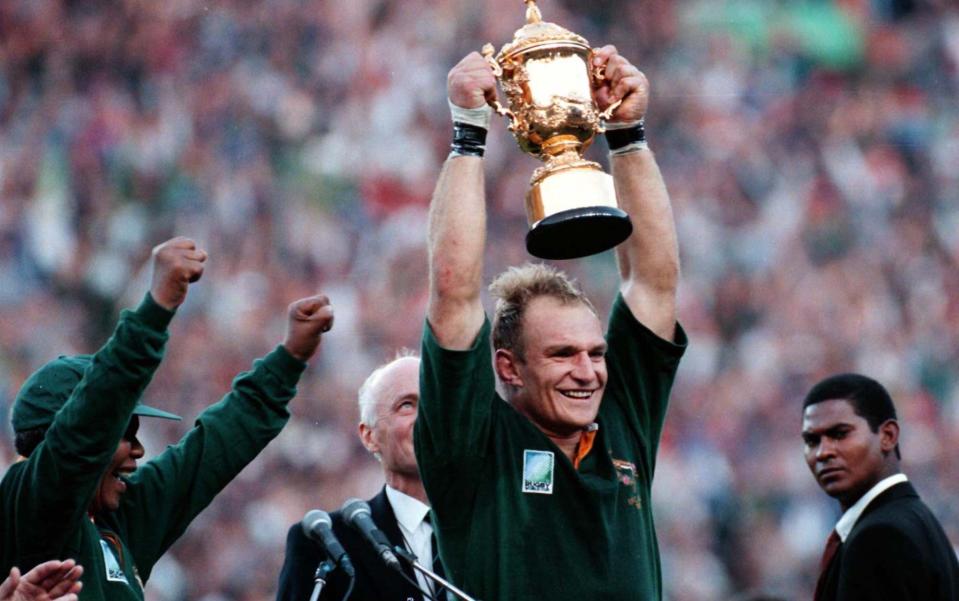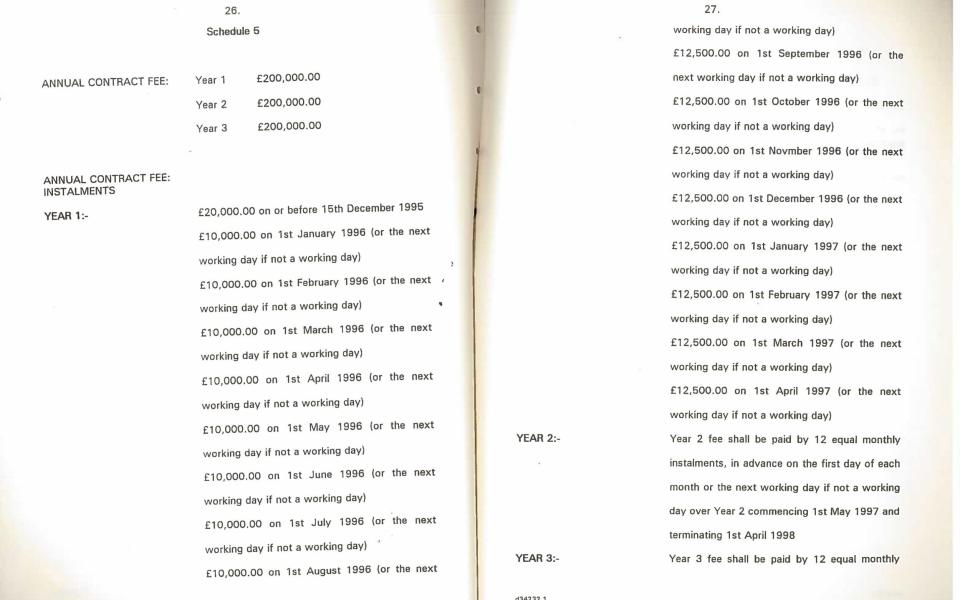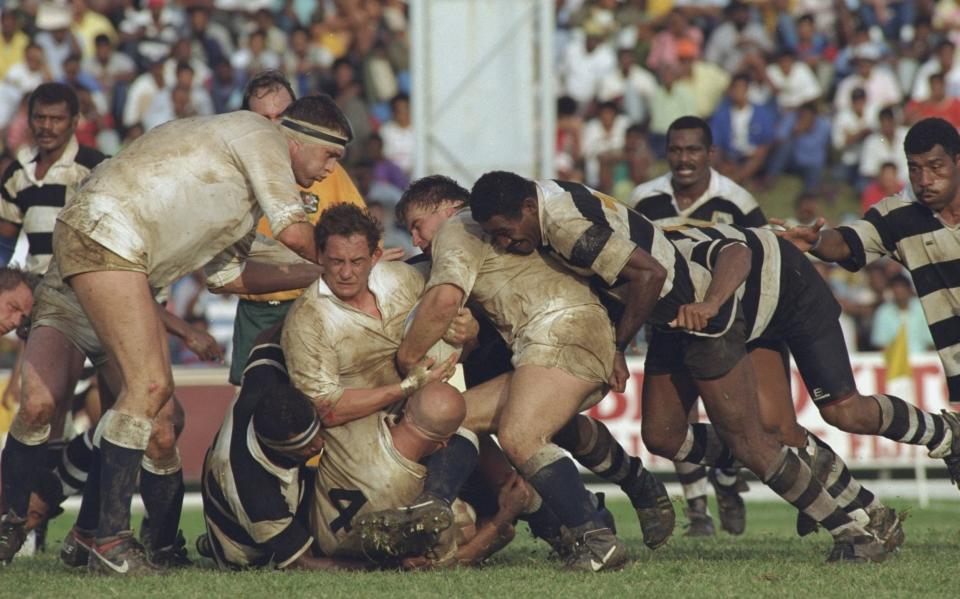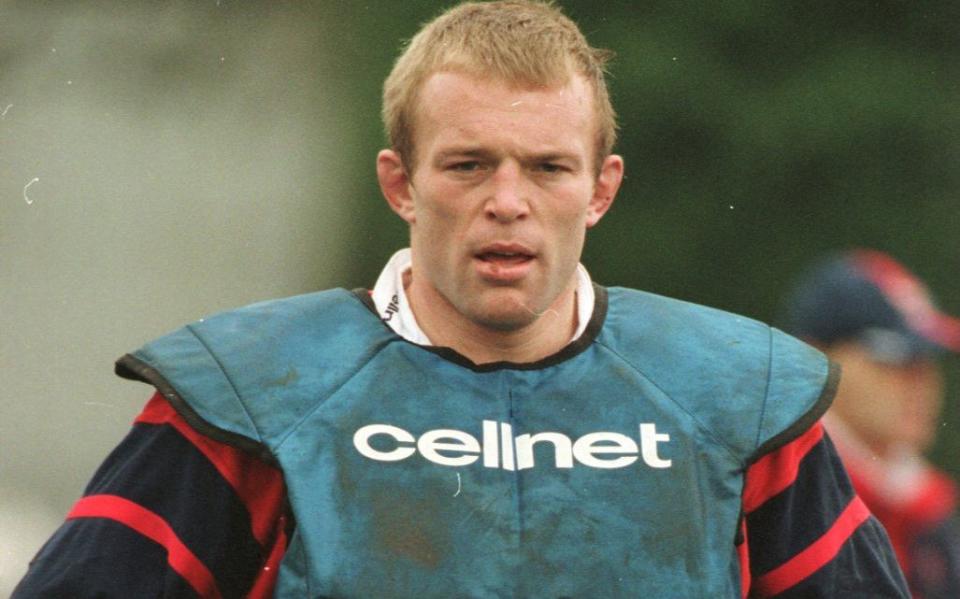It has been sitting in a safe for almost 30 years, but the player’s original contract for the ‘World Rugby Corporation’, the Kerry Packer-backed £200m rebel rugby circus that threatened to set up a breakaway global franchise league in 1995, can now be revealed for the first time.
The document, which remains in pristine condition, serves as a stark – and fascinating – reminder of the ‘rugby war’ that could have ended more than 120 years of test rugby.
And, according to owner, former England and British and Irish Lions lock Martin Bayfield, a moment of missed opportunity for the Rugby Football Union, the consequences of which are still being felt today, with the union on the verge of offering new hybrid contracts to gain greater control of your players.
The battle for the future of rugby on its path to professionalism in the context of the 1995 World Cup in South Africa was fought predominantly in the southern hemisphere, as media moguls Rupert Murdoch and Packer faced off in a race to secure the broadcast. rights that would hasten the end of the amateur game.
Murdoch seemed to have struck the decisive blow when, on the eve of the World Cup final between the Springboks and New Zealand, it was announced that the three main unions in the southern hemisphere (South Africa, New Zealand and Australia) had agreed to a contribution of $550 million . deal with your News Corp organization.
The 10-year deal gave News Corp exclusive television rights to a new annual Tri-Nations international tournament, a Super 12 club competition and all incoming test tours to the three countries.
But what News Corp, and indeed the unions, did not know at the time is that, behind the scenes, the top players from each of the three countries had already been secretly contacted by representatives of the World Rugby Corporation (WRC). , which was fronted by former Wallaby prop Ross Turnbull and latterly backed by Packer.
Around 400 players had signed provisional contracts, including most of those from the New Zealand, Australian and South African teams after the WRC contacted their respective captains, Sean Fitzpatrick, Phil Kearns and Francois Pienaar.


In the end it was the Murdoch-backed unions that prevailed after the Springboks team’s support for the WRC collapsed under pressure from controversial South African Rugby Union president Louis Luyt.
While those machinations between players, unions and broadcasters have since been well documented, what is less known is how close the England team at the time came to signing up to the WRC and turning its back on the Rugby Football Union.
The contract offered to the English players was as lucrative as it was to their southern hemisphere rivals, with the 24-page document, titled “Deed for the Provision of Services”, including the offer of a salary of £200,000 per season, starting 15 December 1995, as well as a match fee of £1,350 per match.


The extensive document, which was branded by Turnbull Hill Partners, a law firm based at Charlestown Mall in New South Wales, Australia, covered every aspect of the player’s life in the new global league that proposed to include 30 franchises worldwide as of September 1996.
“The Corporation proposes to establish a global organization for professional rugby from 1996,” the contract states, even though at that time the game had not yet been declared “open” by the International Rugby Board, the game’s governing body. global now known as the Rugby World Cup.
“The Corporation wishes to contract the services of the Player to play Rugby for the Corporation under the terms and conditions established in this Deed.”
The contract was considered confidential, including not only the amount of money being offered but also the very existence of the deed, which at the time was considered fundamental to the success of signing the world’s best players without their knowledge. of their respective unions in the southern hemisphere, which had separately agreed to the deal with News Corp.
The players who received the contract offer, however, would have had no doubts about the implications of signing it, having to turn their backs on the unions and hand over control of future competitions to “the Corporation”, including changes to the law. and discipline.
What is less clear, however, is where players would play this new professional game, only that they would be assigned a “region” – a territory designated by the WRC on or before December 31, 1995.
“In the event that the Corporation exercises its rights to relocate the Player, and the Corporation has notified the player two months in advance of its intention to exercise such right, the Player, if he does not wish to play for the team nominated by the Corporation, may have a period of one month to negotiate with other teams in an attempt to locate a preferred team that will accept the Player,” the contract states.
“The player must be available for selection by the Corporation or any affiliated body and, if selected, will train and play for any representative Team playing the Game and, in any Competition, conducted by the Corporation in any country.”
It was made clear that players would not be able to play for any other team beyond the start of the contract, meaning players like Bayfield would have had to turn their backs on England.


However, the level of support promised is impressive, including all “direct costs incurred by the player in the performance of his duties under this Deed,” which included clothing, participation in publicity, strapping and equipment, travel to games, room and board, comprehensive medical insurance and disability insurance that would pay 100 percent of the first year of the contract, and 50 percent of the second and third years if the player could not play due to injury.
There was even the foresight to recognize the importance of salary caps, noting that the corporation could introduce them for the benefit of the game and the “viability of teams and competitions.”
Given the decades-long battles to align the hemispheres and resolve conflicts between club and country that were born in those volatile days, what also stands out is the simplicity that the contract attempted to bring to the game that would immediately become known as ‘rugby’. or rugby union’.
“To the extent possible, the games will be arranged to be held primarily between September and April inclusive of each year, HOWEVER, the Corporation reserves the right to introduce a summer competition at any time or from time to time” , he adds.
It is unclear whether or not the WRC envisaged recreating a summer tournament to replace the Lions’ tours, but it is significant that Bayfield, a veteran of the 1993 tour to New Zealand, insisted that in the turbulent days following the 1995 World Cup, English players were gaining ground. towards signing even if it meant they might never have played at Twickenham again.
While high-level negotiations involving players from the southern hemisphere took place in five-star hotels in Sydney, Johannesburg and Auckland, Bayfield reveals that one of the crucial meetings involving England players took place in the least healthy from the Holiday Inn in Crick. the M1.
“When we came back from the World Cup, the East Midlands lads from Northampton and Leicester, including Dean Richards and Tim Rodber, met in that lovely setting by junction 18 and talked about what the options were,” Bayfield told the Telegraph Sport.


“I had doubts about how a game that had been amateur since the day William Webb Ellis was a naughty boy and picked up the ball could become professional overnight and how the administrators, who were amateurs, could suddenly become professional administrators.
“He earned £28,000 as a Bedford police officer”
“But suddenly we had contracts in front of us. They were forming teams and they could place you somewhere where a country might need you, like Australia or the United States. I guess we were all prepared to sign because the figures and numbers were good,” said Bayfield, who at the time was earning around £28,000 as a Bedford police constable.
“It was a fascinating moment for the players. We were asked to make a really important decision. And we were like those vultures in the movie The Jungle Book asking each other: “What do you think? I don’t know? What do you think? I have no idea. But we liked the look of the numbers.
“But because I’m a suspicious police officer, I remember thinking I’d only sign this when I knew it was going to happen. That’s why I put it in my safe, hence the fact that you don’t have it.”
Bayfield says it was not until South African players appeared to withdraw from the WRC that the concept collapsed, and while the RFU dithered, imposing a moratorium on professionalism for a year, club owners in England moved to sign the best. players and took control.
“From that moment the seeds were sown that we are now reaping, without a doubt,” added Bayfield, who kept the contract as what he called a “piece of history,” similar to old jerseys and game programs.
“It is a historical document about the evolution of rugby,” Bayfield added. “The RFU are now trying to get these central contracts, but at that time, if they had gone to the top 100 players in England and said we would pay them £150,000, £100,000 and £75,000 on a sliding scale, we would have paid Everyone has signed and the RFU could have rented those players to the clubs and that’s it. “There would be none of the negotiations between club and country that we are having now.”